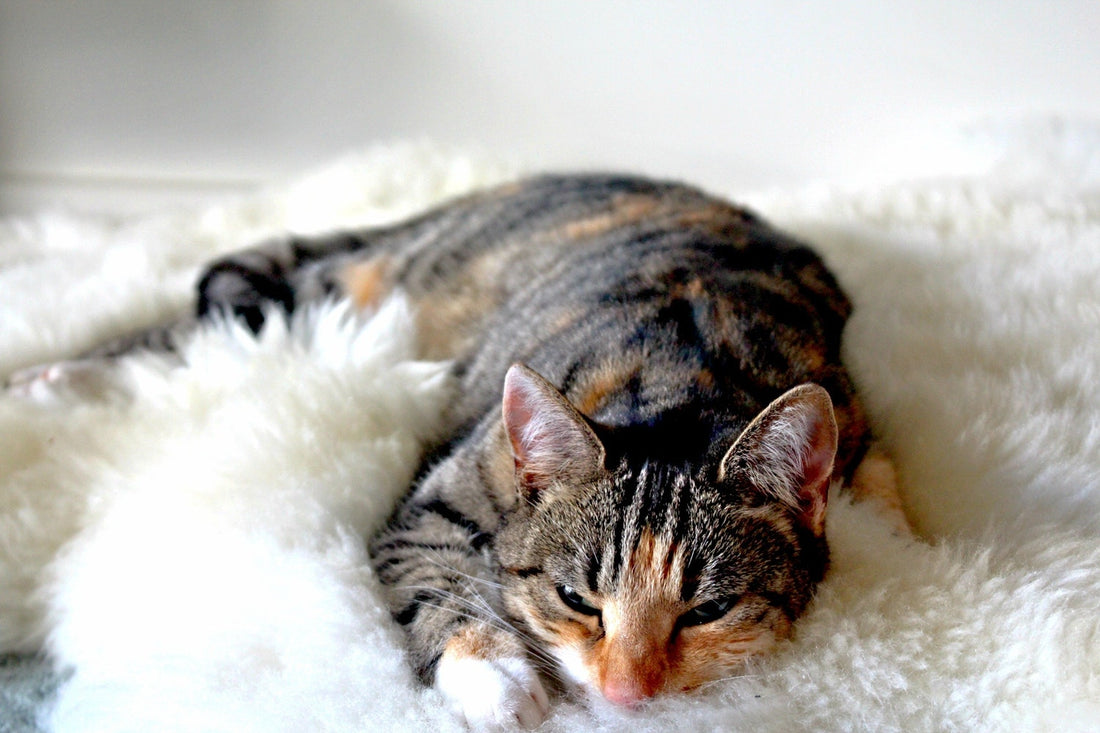
How To Tell If Your Cat Is Depressed
Share
Many cat owners turn to their cats for emotional support when they’re feeling down. They don’t realize that there are just as many occasions when a sad cat would like to turn to their human loved one for the same reasons. The dynamic with your cat should involve some reciprocity. Your cat knows when you need some extra support, and you need to know when your cat needs extra support.
Pets are prone to depression the same way that people are. Many of the signs and symptoms of depression in animals and people are similar.
Here’s what you need to know about recognizing the signs of depression in cats and how to help your animal companion cheer up when they need you most.
Can Cats Experience Depression?
Cats can experience many of the same forms of distress humans can experience, including mental health issues like depression and anxiety — they simply experience them differently. The pathology of mental health problems like clinical depression in a human is a lot more complex and nuanced than depressed behavior in cats. Cats experience the feline equivalent of what people experience, but it isn’t a perfect match. Even though cat depression has fundamental differences from human depression, it’s important to take it just as seriously. Your cat’s well-being is just as important as the well-being of any other member of the human family.How Does Depression Affect Cats?
Depression can have an overall negative impact on your cat’s wellbeing. Depressed cats may have a loss of appetite or neglect their normal hygiene habits, like grooming or using the litter box properly. They may have a distinct lack of energy and be resistant to movement or play. The effects of depression are just as physical as they are psychological, which is why immediate intervention is the best course of action.What Causes Cat Depression?
There are several potential causes for depressive physical and behaviorial changes in cats. Some causes may be highly specific, like your cat feeling a little jealous that you’ve brought a new baby home, human or animal alike. Your cat might miss a family member who moved out, especially if they took one of the other animal members of the family with them. There are several general and common causes of depression in cats that may not be as easy to identify as a major household change. Here’s what you should consider and mention to your vet.Improper Nutrition
High-quality cat food made with fresh ingredients will always be better for your cat than cheap kibble. Although pet food is regulated, lesser quality foods only focus on meeting the absolute minimum requirements for animal nutrition. When you choose a holistic, high quality cat food, you may see changes in your cat. Improved cat health may look like more energy, a shinier coat, and generally a better mood. Think of it this way: don’t you feel better when you eat a balanced meal with plenty of protein and nutrients than you do when you eat greasy pizza? Your cat is the same way. Not all food is created equally, and nourishing food can boost your cat’s mood as much as it can boost their health.Loneliness
Changes in work schedule, the loss of another pet in the house, or a lack of stimulating toys can cause your cat to feel depressed. Although cats are usually very independent, that doesn’t mean they want their pet parents to remain at paw’s length indefinitely. Your cat wants to spend time with you, and they appreciate the moments where you go out of the way to give them some pets as you pass them in the hallway.Frequent Boredom
Your cat also needs something to do. If they don’t have another cat to play with, it’s worth investing in engaging and interactive toys your cat can use when they’re bored. They need the stimulation and the exercise that comes from play. Better still, choose one of your cat’s favorite toys and play with them. Your cat would love more time to bond with you.Distressing Environments
Sudden changes in your household will upset your cat’s routine, and cats are definitely creatures of habit. If you have workers in your home, family members visiting for a few days, loud construction on your neighbor’s house, or a new pet, your cat may not react too kindly. These changes will pass with time. Temporary changes, like visitors or construction, will resolve themselves. Your cat will likely adapt to new long-term changes, like bringing a new cat, dog, or even rabbit into the house. It’s important to observe your cat’s behavioral changes and see what you can do to make them more comfortable.Physical Discomfort
Physical discomfort as a result of illness, injury, or aging can contribute to cat depression. The red flags for many of these things are difficult to spot. Unless your cat’s injury is obvious or visible, you may not know that your cat is uncomfortable, especially if a potential flag like loud meowing is already a normal everyday form of communication. If you suspect your cat may be experiencing significant physical discomfort, it’s important to visit the vet as soon as possible.Recognizing the Signs of Depression in Cats
Many pet owners are very close with their animals. You might simply have a sense that your cat is depressed, and you may be correct. Only a veterinarian veterinary behaviorist can diagnose depression in cats, but you can recognize warning signs and talking points to mention at your next appointment. Here are the most common:- Changes in weight (especially weight loss) and appetite
- Lack of normal autonomous grooming behavior
- Sleeping more than usual
- Vocalizing or making sounds, especially low-toned yowls
- Failing to use the litter box appropriately
- Reduction in affectionate or friendly behavior
- Different postures or body language like tucked ears or tucked tail
- Assuming a fearful or defensive attitude towards people or other animals


